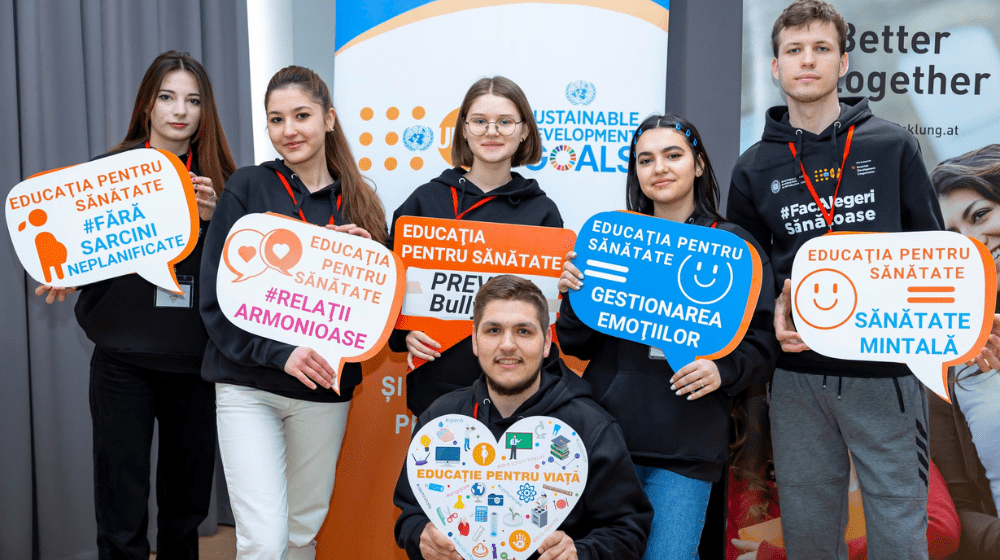85 students in 12 vocational schools and colleges are part of the Peer Educators Network in Life Skills Development (PEN). In the 2022-2023 academic year, they continued to organize informative activities for their peers in vocational education and training institutions in Chișinau, Rezina, Cahul, Nisporeni, Orhei, Edinet, Riscani, and Balti.
Activities of the Peer Educators
Young peer educators are examples of civic activism. They organize non-formal education activities on the development of skills for a healthy lifestyle and job readiness skills through techniques such as social theatre, debates, board games, etc.
”My experience gained as a peer educator makes me believe it was one of the best decisions I made when I became a member of the network. I have learned to be more responsible, to handle difficult situations and, most importantly, I have overcome my fear of public speaking and can now efficiently work with young people and even adults.” (Alexandru Gisca, Peer Educator, Centre of Excellence in Services and Food Processing, Balti)
In spring 2023, PEN members were trained to extend their peer education activities to refugee adolescents and young people. Life skills education programs offered through the peer support method help young refugees improve their mental health and well-being and, as a result, they are equipped with skills to prevent risky behaviors, gender-based violence, and harmful practices in the humanitarian context. In addition, this increases social cohesion and facilitates better social integration of Ukrainian boys and girls into Moldovan society.
What young Peer Educators talk about with their peers
More than 6 000 students participated in activities on life skills and preparation for employment carried out by PEN in the 2022-2023 academic year. Since the launch of the network in 2020, more than 10 000 young people have benefited from its activities.
Educational activities cover topics such as:
- building responsible relationships with peers and adults, easier integration into new groups;
- increased confidence and self-esteem;
- combating stereotypes, discrimination, and gender-based violence;
- personal development and emotional resilience;
- healthy behaviors, preventing adolescent pregnancy and sexually transmitted infections;
- teamwork, public speaking, critical thinking;
- services provided by the Youth Centres Network and Youth Klinic Moldova.
”I became a peer educator at the end of 2022 and was instantly won over by the interesting activities and the atmosphere in the team. At first, I was afraid to talk to my peers, then, due to the training I attended, I started to improve my vocabulary and it became much easier to communicate with my peers within the activities.” (Alina Bitca, Peer Educator, Centre of Excellence in Light Industry, Chișinău)
Activities organized by PEN include information and awareness-raising campaigns, debates, flash mobs, social theatre, public cafés, quests, etc.
Peer education is an effective method, especially among adolescents and young people. It makes young people feel free to discuss sensitive topics with their peers and seek advice from network educators.
Mentoring and support from mentor teachers
The strengthening and maintenance of the PEN in vocational education and training is also due to the mentor teachers in the 12 schools. Each team has a mentor who guides them and helps them plan activities and implement their ideas. Mentors provide support to young educators in developing an action plan and implementing it throughout the academic year.
Zinaida Cazacu, mentor of the peer educators team from the "Vasile Lupu" College in Orhei, says that the peer educators she has the opportunity to work with go through a process of transformation and personal development. ‘Members of the team of educators acquired new skills and a lot of knowledge about a healthy lifestyle. I am there for them to instill authentic values, develop empathetic behaviors and help them adapt the content to the needs of each student they interact with,’ added Zinaida Cazacu.
The course ‘Decisions for a Healthy Lifestyle’ – a priority for vocational education and training?
In May, around 350 students, teachers, non-teaching staff, and managers from 12 vocational education and training institutions were actively involved in discussions about strengthening the role of schools in supporting students in developing life skills, creating a friendly and safe environment, helping them to develop skills to make them able to integrate more easily into the workplace.
All participants emphasized how critical it is to take the ‘Decisions for a Healthy Lifestyle’ course from the first year of studies. Access to the services of a qualified and friendly psychologist, medical services in school, and access to menstrual hygiene products for girls was highlighted as very important.
“The ‘Education for Life’ course is the ‘friend’ that helps teenagers step into adulthood. It helps students develop the skills necessary to make healthy and balanced lifestyle decisions. Young people are prepared to respond to challenges and become aware that they are responsible for the decisions they make," says Vitalie Belii, Director, of Vocational School No 2, Chisinau.
Students who are introduced to Education for Life early in their studies are able to avoid risky behaviors that could lead to dropping out of school and preventing them from completing their studies and therefore entering the labor market.
The Peer Educators Network was established in 2020 by UNFPA in partnership with the Ministry of Education and Research of the Republic of Moldova and with the support of the Austrian Development Agency, within the project ‘Develop life skills and healthy behaviors of students in Vocational Education & Training for their development and job readiness’, implemented in 12 VET institutions. In total, more than 120 girls and boys in VET have become peer educators since the establishment of the Network, and for them, this experience has also been a comprehensive personal development program.


